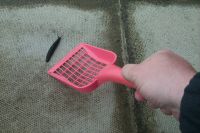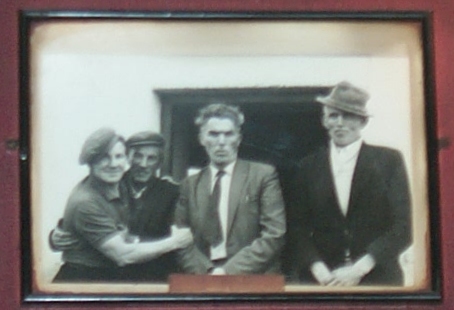Customer Services Department,
Homebase,
Beddington House,
Wallington,
Surrey. SM6 0HB.20th August, 2001.
Dear sir/madam,
I am fed up with your company. As a new house owner, I have only recently come into the market for gardening equipment. On the two occasions I have bought things from your company, however, I have had nothing but grief.
The branch in question is the Bromborough (Wirral) branch, which I now learn is (along with certain other Homebase stores in the region) shortly to close. I can't say I'm at all surprised.
On 3rd July this year, I bought a Qualcast Classic 35s petrol lawnmower from the store. I was given a small discount because the box and instruction booklet had been thrown away. I contacted Qualcast for a replacement booklet. They were superb and sent one right away. It wasn't until I read the booklet, however, that I discovered what else had been thrown away, namely:
- two covers (one internal, one external) for the air-intake
- a moulded foam insert to protect the air intake
- the allen key to open up part of the engine for maintenance purposes
- the screw to hold the petrol tank in place
- the bracket to fix the grass box onto the mower
…all fairly important components of a viable lawnmower, I'm sure you'll agree.
By the time I learnt about these missing parts, I had moved the mower to my new house, 70 miles away from your Bromborough store. I was reluctant, therefore, to return it. Fortunately, once again, Qualcast (who, unlike your own company, clearly do give a damn about customer service) were fantastic, providing all of the missing items free-of-charge. Are Qualcast aware, I wonder, that they are having to provide additional support to purchasers of their products simply because your company is selling them with half the components missing? I am copying this letter to them just in case they aren't.
I visited my parents in Bromborough yesterday. Despite my better judgement, I decided to take the opportunity to buy a top-of-the-range hedge trimmer from your store… Guess what? That's right: there was a vital component missing (the bracket to attach the handle to the trimmer). Once again, I only found out when I was back home, 70 miles away. When I opened the box, it was immediately apparent that I wasn't the first person to do so: some of the polythene bags containing the smaller parts had clearly been opened and re-sealed with sticky tape. I can only assume that another customer had already returned the trimmer because of the missing component, and your staff had simply put it back on the shelf in an attempt to fob it off on the next mug (me) who came along. This time, I was not prepared to ring up the manufacturer of the equipment for a replacement component. Instead, I elected to make the 140-mile round-trip to return the offending item, and to purchase a (cheaper, working) replacement from Do It All.
In light of the above, I hope you understand why I will not be doing business with your company again. If this is the sort of service you offer your customers, I might as well go to B&Q.
Your customer no longer,
P.S. In the interest of consumer awareness, I have published a copy of this letter on my popular website at:
www.gruts.com/archive/2001/08/homebase/c.c. Qualcast Head Office
Gruts website
Slug-slinging
Extract from an e-mail to Carolyn:
We appear to have a major problem with slugs. Whenever it rains, thousands of them appear on our patio… and it rains here an awful lot.
But I've come up with a brilliant solution to the problem: the slug-slinger. In truth, this is nothing more than a common or garden orange pooper-scooper, bought for 99p from the local supermarket. It's shaped like a child's seaside spade, but with a criss-cross framework of slats. The slats make it ideal for slug-slinging, as they cut down on air resistance, as well as giving the slug less to stick onto.

By a process of trial and error, I have worked out the best method for using the slug-slinger. First, find your slug, then tap it lightly with the slug-slinger. This causes the slug to shrink its body size and to grow more rigid (both of which make it easier to sling). Next, scoop the slug onto the end of the slinger. This is fairly easy, as slugs thoughtfully provide their own mucus adhesive. Next, run down to the bottom of the garden and catapult the slug into the adjacent field. The first time I tried this, I got the trajectory all wrong and ended up sending the slug in a loping parabola, way too high, so that it came down SPLAT! on top of the wall. I have since worked out that it's all in the wrist action: aim low and snap sharply with your wrist at the end of your catapulting motion. This helps dislodge the slicky slug from the scooper and gives you an extra three or four yards' range. With any luck, you can propel the slug a good dozen yards or so into the field.It gives a whole new meaning to the term slinging in the rain.
I don't think slugs have a homing instinct, but I'm keeping my eyes peeled to see if any of them try to sneak back over the wall.
THERE'S ANOTHER OF THE LITTLE BASTARDS ON MY PATIO NOW!
I'm off to do some more slinging.
Postscript: I later realised that, once I have slung the slugs, but before they hit the ground, they could be referred to as ICBMs (inter-campal ballistic molluscs). Since writing the above, I have also developed a second technique for use while out on Slug Patrol: Slug Flicking (I had to be careful how I typed that!). This involves using the slug-slinger to flick the slug straight off the ground over the garden wall. You can't flick slugs as far as you can fling them, but the technique comes in handy when there are a lot of slugs around and you are pressed for time. Incidentally, my slug-slinging record now stands at about 25 yards, but it didn't really count: it was wind-assisted.
See also: BBC News - Robot slugkiller ready to roll
Snippets - July 2001
How to find out your mobile phone's serial number:
Dial *#06#
Great Name
The Dutch environment minister is called Jan Pronk.
Spooky!
I was typing away in the office today (10th), when I thought I felt a hand on my shoulder. When I turned round, there was nobody there. The same thing happened last Sunday, but the hand was on my right buttock that time! Occam's Razor would conclude that I am haunted by a perverted ghost.
Overheard in the pub:
"There's a rumour that Stan Laurel was Clint Eastwood's father."
"Bollocks!… Mind you, though…"
Practising
Jen and I played doctors and nurses last Friday night. No, not that sort of doctors and nurses, you wicked reader; just like real doctors and nurses, we were practising medicine.
You see, a real (male) nurse was due to come and take my blood pressure on Saturday morning for insurance reasons. Every time I have my blood pressure taken, I faint (yeah, laugh away). So Jen borrowed a blood-pressure-measuring-thingy and stethoscope from her friend, Joy, and we got practising.
I didn't like it at all, but discovered that it wasn't nearly so bad if I knew what pressure Jen was going to pump it up to before she began, and I could watch the pressure gauge.
The practice was well worth the effort: the (extremely greasy) male nurse came on Saturday morning, and I managed to stay conscious for the whole ten minutes he was there.
My blood pressure was 120/70, which, according to Joy, is pretty damn good.
Criminal Genes

A nation rejoices: Lord Jeffrey Archer has been detained at Her Majesty's (and everyone else's) pleasure, having been found guilty of perjury and perverting the course of justice.
The general feeling in Britain seems to be that it couldn't have happened to a nicer person. Seldom in a single day have I heard the word comeuppance used by so many people. The general dislike for Archer seems to be founded on a number of factors, not least the verifiable facts that he is:
- a lying bastard
- a Tory
- the author of crappy novels
- a multi-millionaire
- a client of prostitutes
- the beneficiary of alleged insider-dealing
- an alleged Kurd-burglar (allegations since withdrawn)
- a person who spells Geoffrey with a J
- a complete and utter twat
The British press is having a long-awaited, long-prepared-for field day, with more than one of its number pointing out the similarities between the shortfalls of Archer and those of his cheating, philandering father. To its eternal shame, BBC2's flagship news magazine, Newsnight, began a piece on Archer on the day of the court ruling by observing that he inherited the genes of his cheating father; the clear implication being that his criminal behaviour might somehow be attributed to his genes...
Bollocks! My dad and I both like John Wayne movies. Does this mean that there is some genetic basis to my liking for the The Searchers and True Grit? Isn't it so much more reasonable to attribute it to the fact that I was brought up in an environment where I could learn to appreciate John Wayne's movies (because they were on our television all the time)? Similarly, if you are brought up by criminals, isn't it more likely that you will learn to treat the law with contempt?
I'm not saying that there isn't a genetic element to criminal activity (although, if there is such an element, I suspect it is likely to be very minor), but the sort of flippant, throw-away remarks made by the likes of Newsnight are irresponsible and dangerous. We are all products of our genes and our upbringing; you cannot separate the two. In the words of one of my favourite novelists, the late, great Canadian, Robertson Davies:
Nature and nurture are inextricable; only scientists and psychologists could think otherwise, and we know all about them, don't we?
See also:
Gruts: Jailbird Jeff's Stir Tally
BBC News: Archer jailed for perjury
BBC News: Police confirm Archer aid probe
Cheryl Ladd

Cheryl Ladd, Charlie's cutest angel, is 50 today. This cannot be!
Cheryl (along with her angelic co-stars and my friend Carolyn) left an indelible impression on my formative years. Especially in the Hawaiian episode where Cheryl went skuba diving in that black bikini. How can she possibly be 50?
Of course, when I was watching Charlie's Angels, the 14-year age gap between Cheryl and me was inconceivably large; now it seems alarmingly small. Is it really only 14 years until I will be 50? Just think: by then, Cheryl will be 64 (cue Beatles song)!
My infatuation with Cheryl wasn't some temporary whim, however; it required profound dedication. I bought all the posters (the one of her in the white dress, showing a lot of leg and holding a revolver was my favourite); I managed to acquire her eponymous LP (the track Skinnydippin' conjured up all sorts of images in my impressionable teenage mind); and I even wrote a letter to the Mayor of Huron, South Dakota (Cheryl's birthplace), suggesting that she be given freedom of the town. I still have the reply: the people at the Huron Chamber of Commerce were inclinded to agree.
The only criticism I would ever level at Cheryl was that, even back then, I didn't much appreciate all those 1970s clothes; I would have much preferred it if she hadn't worn them!
Anyway, enough of all this nostalgia! The world moves on.
Happy birthday, Cheryl, wherever you are.
Snippets - June 2001
Letting Oneself Go:
You finally realise you've let yourself go when a drunken tramp stops you in the street and tells you it's about time you lost some weight. The sad thing is, you probably think I made that up.
Beaullucas:
While consulting a dictionary for some help on a crossword the other evening, I discovered that the word bollocks is derived from the Old English beaullucas, meaning testicles. This amused me far more than it should have.
Advice to the Young Writer:
Avoid the avoid clichés like the plague cliché like the plague.
Bill Gates' Cost-Benefit Calculation
During one of my many idle moments last week, I wondered how much money Bill Gates would have to drop before it was worth his while bending over to pick it up.
During one of my many idle moments this week, I decided to work it out…
Assumptions made:
- Bill Gates' personal worth is approximately $78.74 billion.
- Even if he doesn't sell a single Microsoft product ever again, with this kind of money in the bank, Bill can expect to earn at least 10% p.a. in interest.
- It would take Bill 2 seconds to pick up the carelessly dropped money.
- There are approximately 31,557,600 seconds in a year.
Calculation:
Interest earned by Bill Gates in 2 seconds =
($78.74 billion X 10% ÷ 31,557,600) X 2 =
$499
i.e. In answer to my original question, Bill Gates has to drop at least $500 before it is worth his while bending over to pick it up.
… And the nutter still works for a living!
Two Black & White Masterpieces
I've just returned from one of my regular pilgrimages to Ireland. I like to try to visit at least once a year, primariy, it must be said, for the Guinness (note the definite article). The legends are true: the black and white stuff really is that much better in its homeland (even though they serve it cold).
One of the very best places to sample the Guinness is legendary O'Donoghue's pub in Merrion Row, just off St Stephen's Green in Dublin. I enjoyed my first ever pint of Irish Guinness there, at 11 o'clock one Saturday morning in November 1989 (five minutes after my friend Mike had dumped his awful girlfriend over the phone). We went to O'Donoghue's to celebrate, and had to climb over a traditional folk music band to get into the place: it's that kind of pub.
O'Donoghue's hasn't changed at all in the intervening 12 years: the back room, where I ordered my first Guinness is still dark and dingy and wonderful, its walls covered in framed photographs of anonymous old folk musicians.

(Sorry about the blurring - it's very dark in there.)
The best photograph of all - one of the most remarkable photographs I have ever seen, in fact (and I speak as a person with more than a passing interest in photography) - depicts four middle-aged men standing outside a doorway. If the other photographs in O'Donoghue's back room are anything to go by, these four men must have been folk musicians, but they certainly don't look like musicians to me. Furthermore, the way they're all looking at the camera makes me wonder whether they've ever had their photograph taken before.
A sticky label stuck on the bottom of the photograph presumably once gave some details of who the distinguished gentlemen were, but it has faded over the years and is now completely illegible. If anyone reading this knows anything about this photograph, please email me.
Why do I like the photograph so much? Because it shows that simple snap shots are capable of capturing the decisive moment every bit as well as photographs taken by professionals. Just look at the facial expressions and body-language: the restrained uneasyness of the two men on the right, and the sheer excitement of the two younger men on the left. If I could take a photograph like that, I'd call myself a photographer.
Postscript: The identity of one of the men in the photograph has now been resolved.
A Warm Welcome

The British might no longer have an empire, a half-decent soccer team, or even a sense of national identity, but one thing can be relied on (if racial stereotypes are anything to go by): their beer, unlike their climate, remains resolutely warm.
And long may it stay that way.
A Matter of Taste
Let's make one thing quite clear: when I say that beer should be warm, I'm not talking extremely warm, luke warm, or even tepid; I'm talking relatively warm. Warm, that is, compared to the brews favoured by people living in warmer climes (and, regrettably, an increasing number of misguided Brits). A good pint of beer should be refreshingly cool when quaffed, but the one thing it most certainly shouldn't be is chilly.

As with any other part of the anatomy, when the mouth becomes cold, it starts to lose sensation, growing increasingly numb. This numbness is manifested in a diminished sense of taste. That's why most food stored in refrigerators tastes better if allowed to warm slightly before being eaten (try it with some cheese, or even ice cream, some time). Foodstuffs aren't refrigerated to improve their taste; they're refrigerated to prolong their shelf life. And prolonged shelf life is the sole reason for cold beer.
Trouble in Store
It's all about storage. Traditional British beer (or real ale, as aficionados call it) keeps for only a few precious days, requiring careful storage at exactly the right temperature by expert cellarmen. Like a good wine or whisky, it continues to improve in the barrel, and must be consumed at just the right time. Because of this, no two barrels taste exactly the same.
Real Ale: beer which continues to ferment and mature in the cask after brewing
Lager: a light beer kept for up to six months before use. [German: Lager, a storehouse]
—Chambers Dictionary
Continental-style beer, on the other hand, is designed primarily with convenient storage in mind—even its generic name, lager, is derived from the German word for a storehouse. Storing it requires little or no skill, so that the beer served up in one pub tastes (if tastes is the right word) exactly the same as the same brand served up in any other pub. You never hear a lager drinker remark on how good a particular pint tastes: they all taste exactly the same—that's the whole point.
(Not that there's anything wrong with consistency, you understand; but in a world where everything tastes the same, there's no opportunity for excellence.)
The powers that be in the brewing industry have spent millions of pounds conning the British public into believing that continental-style beers are in some way superior to their own traditional ales. And the Brits have actually fallen for it (even though their home-grown lagers are but pale imitations of their slightly less vapid continental counterparts). The big breweries would prefer us all to drink lager, because it is easier to store for long periods, so there is less wastage. Lager is also much easier to manufacture on a grand scale, becoming an exercise in bulk chemistry, rather than a skilled art.
The new-found popularity of lager in Britain was one of the greatest marketing coups of the Twentieth Century—promoting a product that nobody wanted from a zero-percent share of the market to market leader, all in the space of a couple of glitzy advertising campaigns (…Probably™).
Desecration
…a quart of ale is a dish for a king
—William Shakespeare,
The Winter's Tale
Having decimated the market for real ale, the big breweries are now moving in for the kill. The recent introduction of so-called smooth flow ales could well be the final nail in the coffin: cold, fizzy counterfeits of traditional British ales, designed with simple storage in mind, and aimed primarily at the youth market. And they're selling like hot cakes. The next thing you know, they'll be adding lime to the stuff, just to add that little bit of oomph!
Even the Irish are at it: Guinness Extra Cold, I ask you. They should be ashamed of themselves.
Enjoy It While You Can
Time is running out. There may be few more opportunities left to sample traditional British real ale at its best: warm.
So, here are some top tips on how best to savour the experience:
How to Experience British Ale
- Take along a friend or two
Good ale cannot be fully enjoyed on one's own—it should be a shared experience. The Irish call this the craic (pronouced crack) and think they invented it. The term derives, in fact, from Elizabethan England. (No correspondence from irate Irishfolk please—and, while I'm at it, Shores of Erin was originally called Shoals of Herring, and was written by a Scot (Ewan MacColl), who also wrote Dirty Old Town about Salford, not Dublin.) - Choose your pub carefully
Avoid like the plague any pub described as family friendly: these are nothing more than licensed crèches—you'll have bawling brats running amok, treating the place like a bloody playground. Also avoid pubs with satellite TV, juke boxes, background music, karaoke machines, and (if possible) fruit machines. Good ale can only be appreciated in peaceful surroundings (accompanied by the gentle background hubbub of other civilised drinkers). Live music is all right, provided it involves fiddles, mandolins, acoustic guitars, etc—no amplifiers. - Check that the beer is hand-pulled (as opposed to gas-pumped)
If the beer is dispensed by pulling several times on a long handle, rather than flipping on a small switch, you're probably safe, but BEWARE—sometimes devious breweries disguise gas-pumped taps as the real McCoy (yes, Burtonwood Brewery, I'm talking about you)—if they don't pump it by hand, it's not real ale. - Avoid any ale described on the pump as smooth, cold, or Greenall's
Conversely, leap at the chance to sample any ale described as Timothy Taylor (Madonna's favourite), Burton, Theakston's, or free. - Beware of any pub which has more than a handful of real ales
Real ale does not keep. Pubs with dozens of real ales rarely sell enough of any one type to ensure a fresh supply. Their ales tend to be stale (but still preferable to lager). - On the whole, ensure that the ale is at least 4.3 ABV (alcohol by volume)
Anything less is likely to be gnats' piss. (There are a couple of exceptions to this rule—most notably, Timothy Taylor Golden Best, which has an ABV in the low 3's, but has a kick on it like a mule.) Anything more than 5.0 ABV is likely to be loopy juice (and, therefore, definitely worth a try). - Remember that the term Best Bitter does not necessarily mean that it is the brewery's best bitter
Quite often, the opposite is true: breweries often use the term best bitter to describe their standard beer. Check if there are any other brews available from the same brewery and, if they have a higher ABV, try them. - Order a whole pint in a thin-lipped glass
Half-measures are no good—you need enough to gulp (see below). Thick-lipped glasses (e.g. the dimpled barrel glasses with handles) create too much of a barrier between your own lips and the ale. People who insist on drinking from barrel glasses are invariably tossers. - Ensure that your pint doesn't have too big a head
Under English law, pubs are entitled to leave a reasonable head (whatever that may be) on a pint of ale, but ask for a top-up if the head is any thicker than half an inch (1cm). Also, allow time for the ale to settle (or rise) before paying: what may look like a reasonable head can become a lot thicker if the ale is too lively. Good ale is seldom lively, but lively ale can sometimes be improved by stirring briskly with a clean index finger—preferably one's own. - Sit down, for Pete's sake!
What is it with all this standing up it pubs nowadays? Good ale cannot be fully appreciated from a perpendicular position. Don't ask me why; it just can't. Besides, sitting down gives you a shorter distance to fall. - Test the temperature of the ale by holding the back of your hand against the glass
If it feels in any way chilly, leave it until the chill has gone. A good temperature to aim for is 54°F (12°C), but, whatever you do, don't check the temperature with a thermometer—they'll think you're a sad nutter from the Campaign for Real Ale. - Drink in gulps
This doesn't mean that you should down your pint in one, but, when you do drink, take in reasonably large mouthfuls, hold each one in the mouth for a few seconds, then swallow it in a single gulp. The taste receptors most sensitive to the bitter taste of the majority of real ales are concentrated at the back of the throat; gulping, therefore, enhances the taste. Holding the beer in your mouth before swallowing allows you to appreciate the subtle nuances of the brew and, more importantly, warms it up slightly before it hits the back of your throat. Genteel sipping should be left to the lager drinkers and G&T Brigade. - Avoid going to the toilet for as long as possible
Once you do spend a penny, the sluice gates will open, and you'll be going all evening. - Repeat steps 8 to 12 as many times as possible